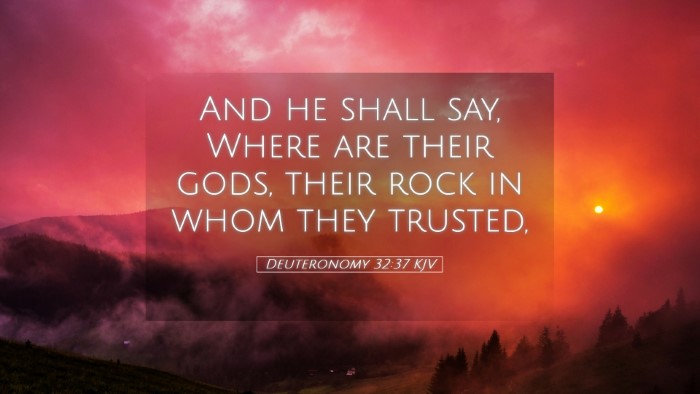Commentary on Deuteronomy 32:37
Verse: "And he shall say, Where are their gods, their rock in whom they trusted?" (Deuteronomy 32:37, ESV)
Introduction
This verse sits within the Song of Moses, a poetic reflection on the nature of God’s faithfulness contrasted with Israel’s unfaithfulness. It acts as a profound reminder of the futility of idolatry and misplaced trust. As we explore this verse, we draw on the insights of renowned public domain commentaries by Matthew Henry, Albert Barnes, and Adam Clarke. The reflections provided herein aim to be meaningful for pastors, students, theologians, and Bible scholars.
Contextual Analysis
Deuteronomy 32 is a pivotal chapter where Moses rehearses the history of Israel and the inherent dangers of turning away from God. In the context of the surrounding verses, verse 37 highlights the inevitable shame that comes from reliance on false gods.
Moses' Intent
Moses, as the servant of God, seeks to alert Israel to the consequences of their actions. His song serves as both a warning and an admonition. Matthew Henry elucidates that the reference to "their gods" implies both the gods of the nations surrounding Israel and the idols that Israel has been tempted to follow.
Understanding Idolatry
The search for security in worldly things is a central theme. Albert Barnes interprets "where are their gods?" as a challenge to those who have turned to idols during times of crisis. It prompts profound self-reflection on what constitutes our reliance in tumultuous times.
- False Security: Sets the stage for discussion on the illusions of safety that idols provide.
- Contrast with God: Highlights God as the ultimate Rock, distinguishing Him from the weakness of created substitutes.
Divine Sovereignty and Judgment
In the verse, there is an implication of divine scrutiny. Adam Clarke comments on the visible results of God’s judgment against the nations who turned away from Him. The rhetorical question posed by God reflects the futility of relying on constructed deities when facing divine judgment.
Implication for Believers
This poses a significant challenge for contemporary believers. Do we find ourselves in moments of trial turning to the 'gods' of our own making? This self-inquiry adds to the depth of understanding God seeks from His people.
Historical and Theological Reflections
Moses' proclamation serves not only as a historical account but also as a theological reflection on divine faithfulness versus human unfaithfulness. The mention of trust underscores a relational aspect: trust in God versus trust in human efforts.
The Role of Trust in Salvation
Henry mentions the psychological aspect of trust; when one trusts in something that ultimately fails, deep despair follows. This holds true for Israel and serves as a caution for modern believers. Trust doesn’t merely rest upon an ideology but enters into the realms of spiritual assurance.
Pastoral Applications
This verse provides rich material for pastoral teaching and application. Pastors can harness its message to remind congregants of where true strength and protection lie.
- Revisiting Idols: Encourage congregations to identify contemporary idols in their lives and challenge them to inquire about where they seek refuge.
- Faith in Times of Trouble: Use this verse to comfort believers that their faith must rest on God's unchanging nature rather than the shifting sands of human-making.
Conclusion
Deuteronomy 32:37 challenges us to reflect on our dependence on God in the face of life’s uncertainties. It exhorts us to abandon the idols that we may inadvertently exalt, and to recognize the futility in any trust placed outside of God. This verse remains a timeless warning against the allure of idolatry and a call back to the foundational rock of our faith—our God.


